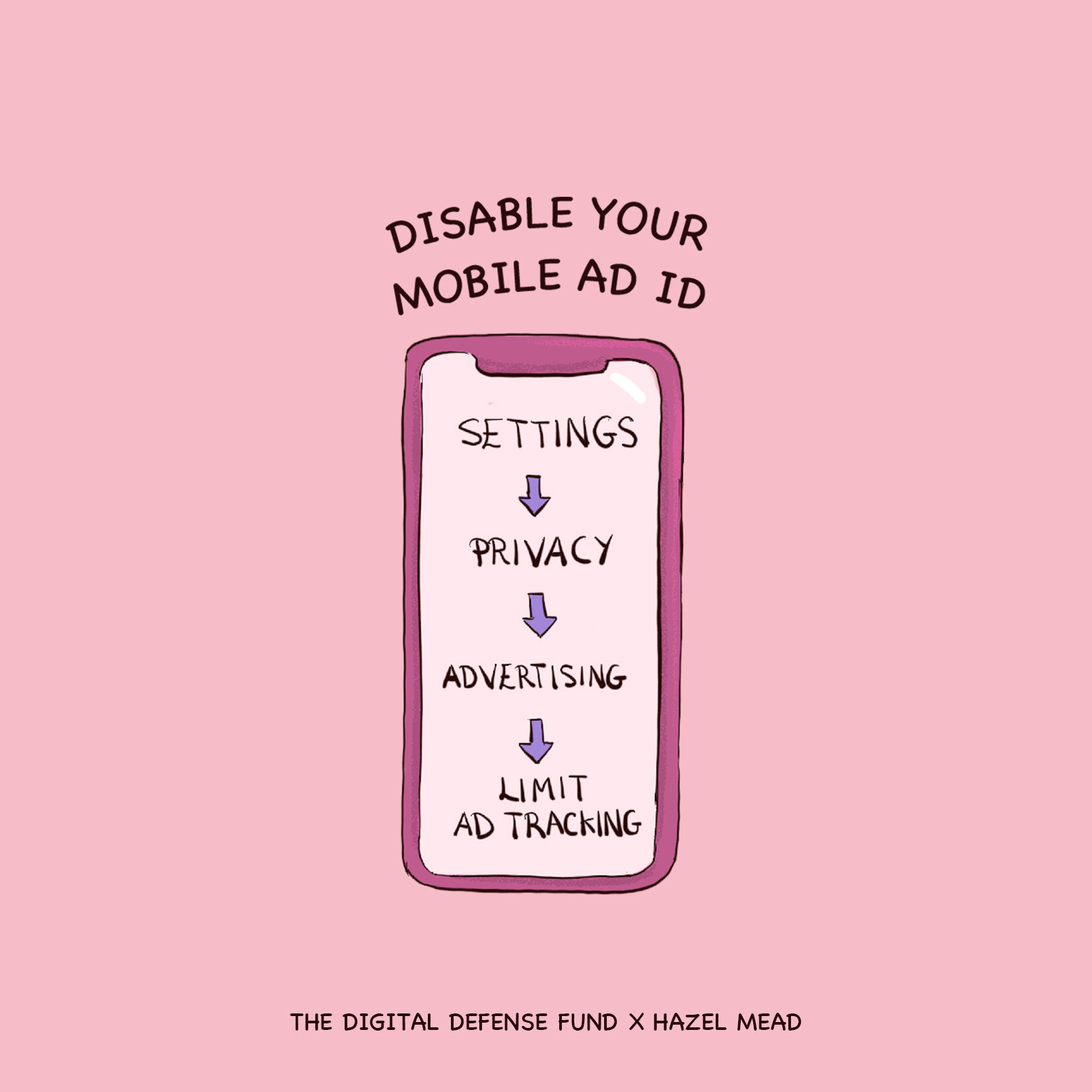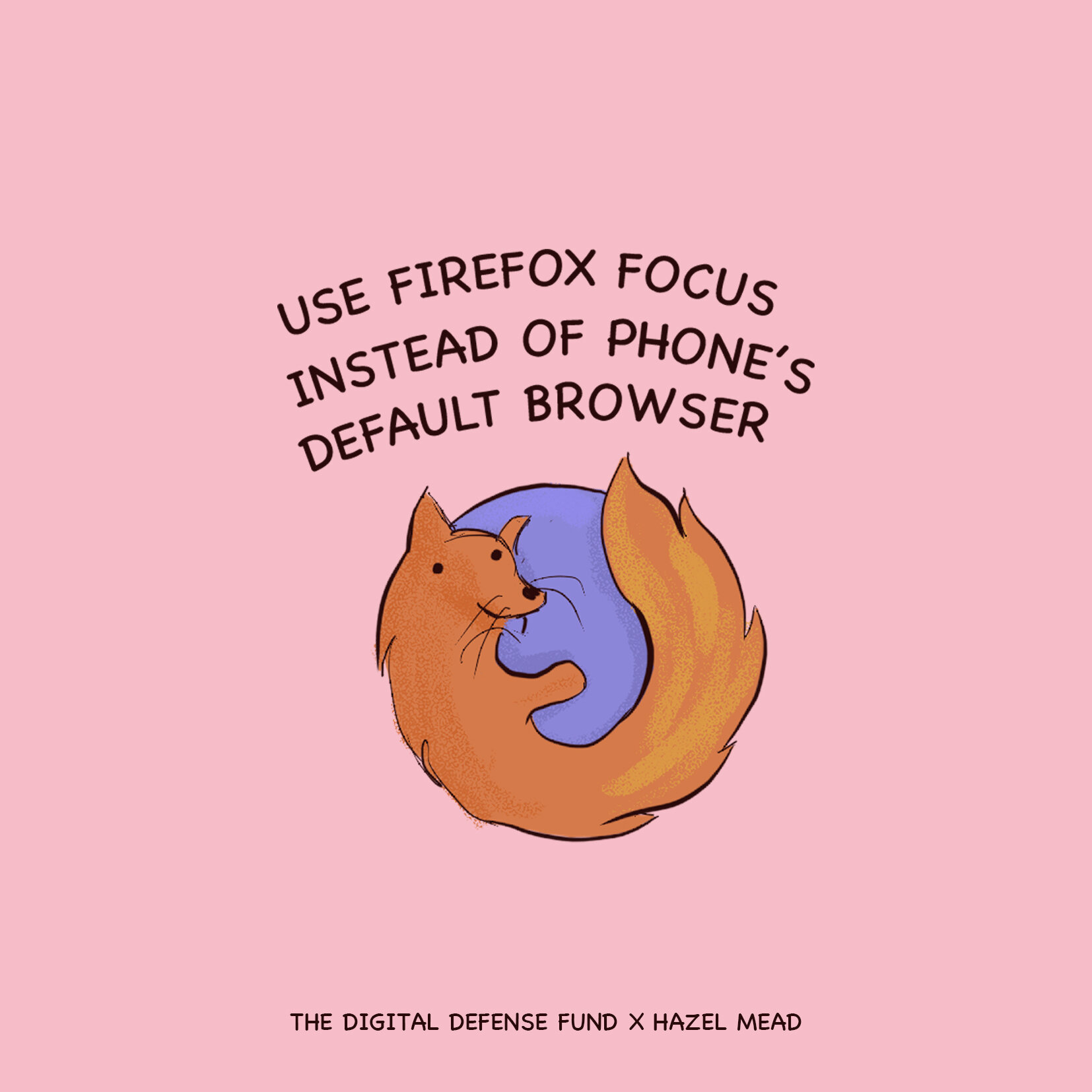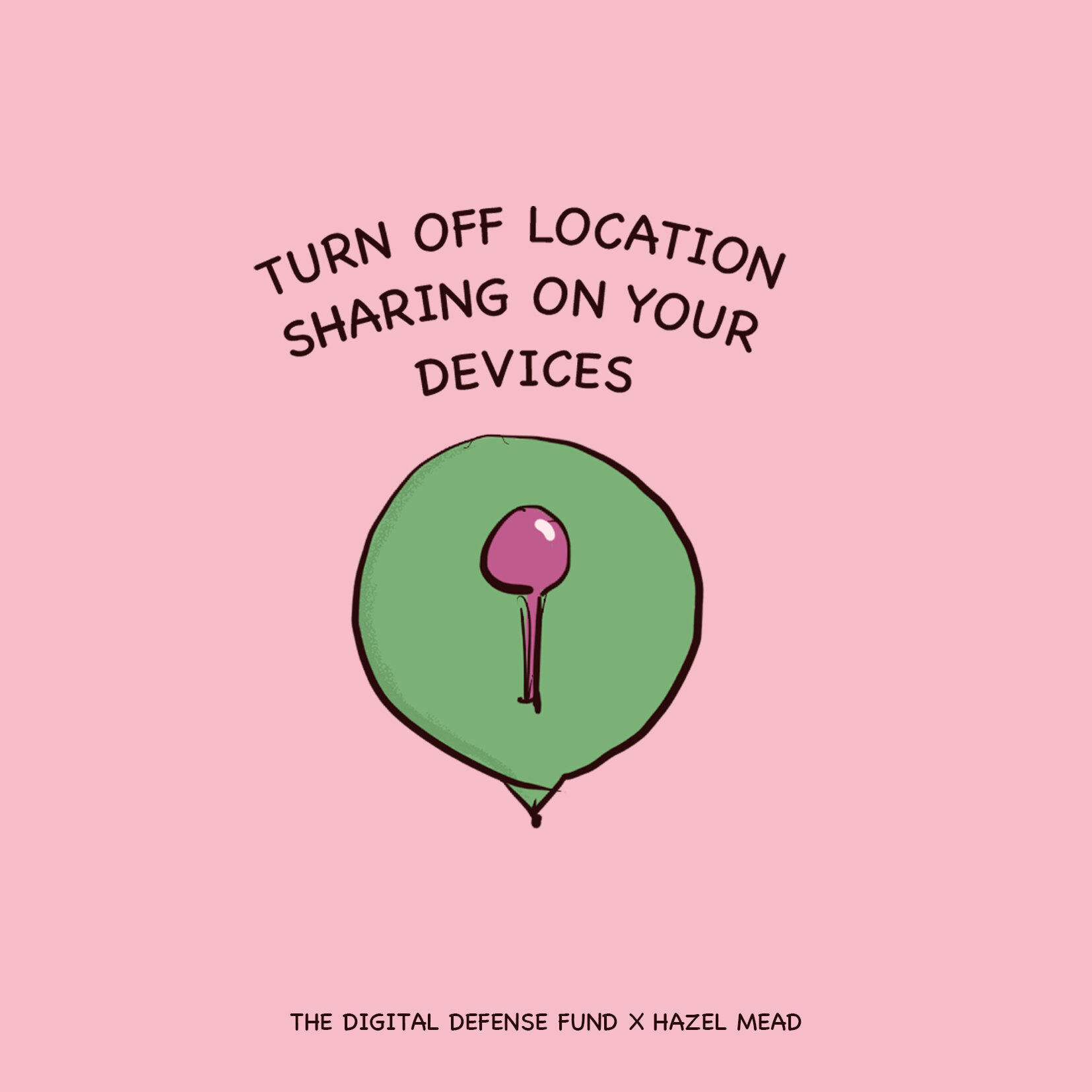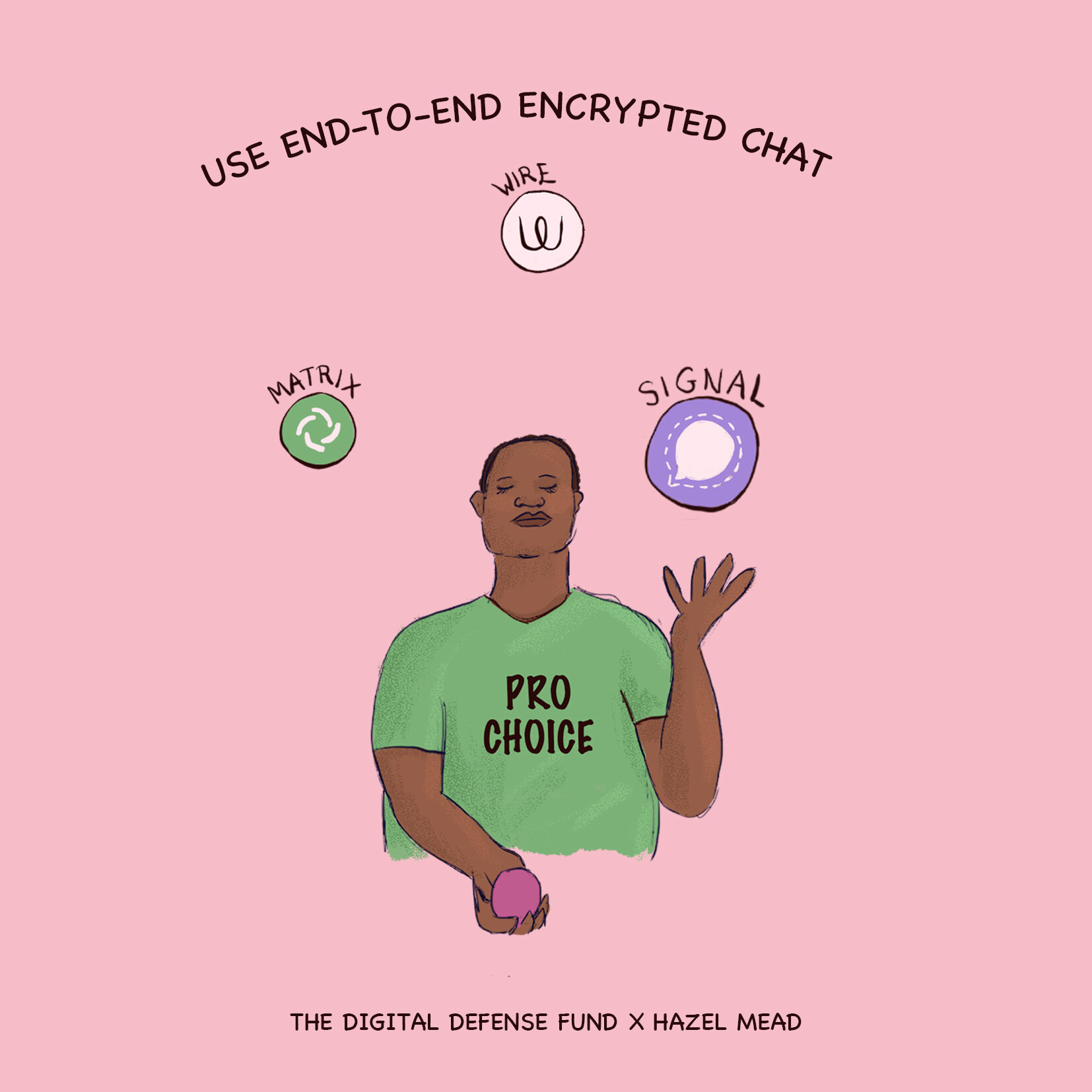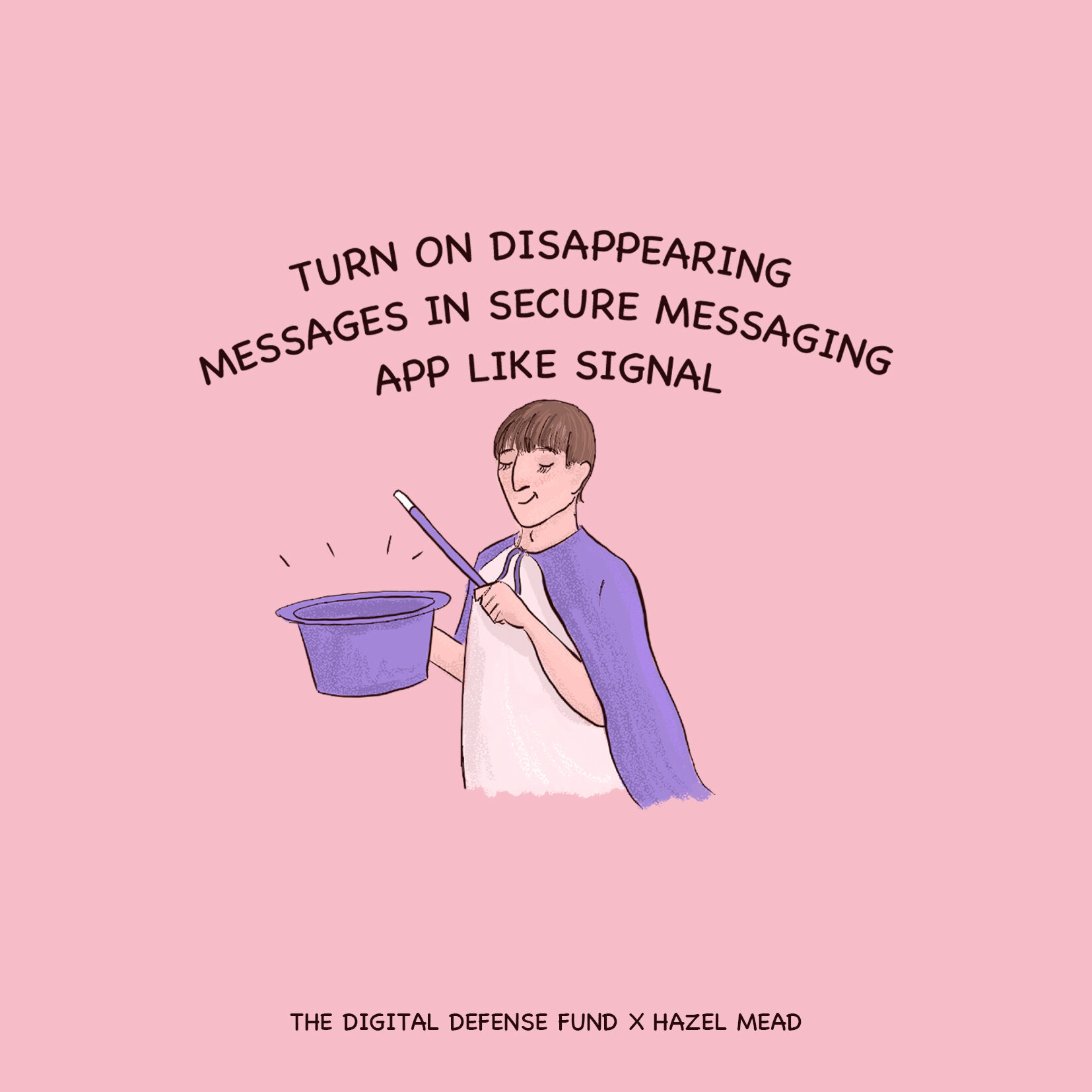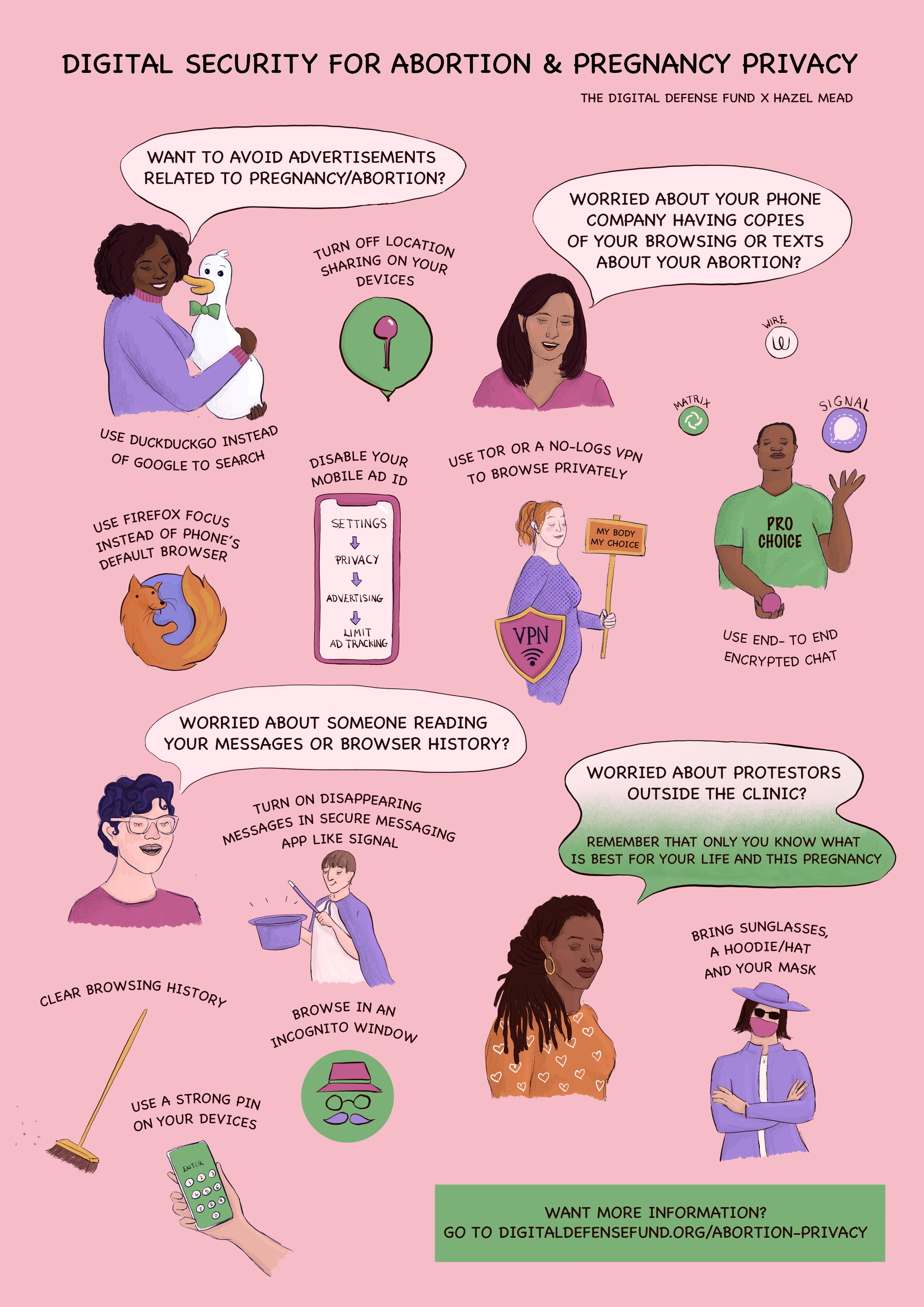Keep Your Abortion Private & Secure
We’re happy you’re here to learn more about digital security & abortion!
Want to avoid advertisements related to pregnancy/abortion?
The problem: While browsing the internet and using our phones feels private, many companies actually watch what we do online and use our phones to track where we go. These records are used to target us with ads, and sold to data brokers and advertising firms. This is how Facebook can show you an ad for the items you just browsed in an online store!
The solution: If you want to keep your searches and movements private, follow these steps:
This article from the New York Times has illustrated instructions for turning off your mobile ad ID on Android & iPhone. Turning off your mobile ad ID will limit the ways that companies can connect your location, search data, and browsing history.
Opt out of personalized ads on Google.
This article has instructions for turning off personalized ads in Google. You’ll have to log into your Google account, navigate to “Data & personalization”, find the “Ad personalization panel”, and uncheck the box about personalizing ads.
Opt out of targeted ads on Facebook & Instagram
This article has instructions for opting out of Facebook’s targeted ad infrastructure. Find your Facebook settings, then click on the “Ads” category, and opt out of the various options on that page, including ads that follow you around the internet (no thank you!) and ads on Facebook based on websites you’ve looked at (boundaries, please!).
Use DuckDuckGo instead of Google to search
Did you know that Google saves all your searches and keeps them both in your Google account and in their servers? DuckDuckGo is a privacy-focused search engine that does not save your search data or collect any information about you. DuckDuckGo does not sell your data to advertisers, either.
Use Firefox Focus instead of your phone’s default browser
Your phone’s browser stores your browsing history and lets cookies and scripts track you. Firefox Focus is a privacy-focused browser that blocks third party trackers, which can be used to target you with ads, and Firefox Focus won’t sell your data.
Don’t want Big Tech companies to store information about your pregnancy/abortion?
The problem: While browsing the internet and using our phones feels private, many companies actually watch what we do online and use our phones to track where we go. All of these companies — Google, Facebook, Amazon, your cell phone service provider, your internet provider, any app with access to your location data — keep records of what we do. These records are not only used for advertising, but can also be bought by governments and handed over to the police if the company gets a warrant.
The solution: If you want to keep your searches and movements private, follow these steps:
This article from the New York Times has illustrated instructions for limiting apps’ access to your location. Many apps ask for location permissions and sell that data to advertisers. Law enforcement also buys this data to surveil oppressed communities.
This article from the New York Times has illustrated instructions for turning off your mobile ad ID on Android & iPhone. Turning off your mobile ad ID will limit the ways that companies can connect your location, search data, and browsing history.
Use DuckDuckGo instead of Google to search
Did you know that Google saves all your searches and keeps them both in your Google account and in their servers? DuckDuckGo is a privacy-focused search engine that does not save your search data or collect any information about you.
Use Firefox Focus instead of your phone’s default browser
Your phone’s browser stores your browsing history and lets cookies and scripts track you. Firefox Focus is a privacy-focused browser that automatically deletes your browser history and blocks third party trackers.
Worried about the person who pays your phone bill seeing your texts?
The problem: Often the person who pays your phone bill can log in to the account and see all the texts and numbers you’ve contacted.
The solution: Use a Voice Over IP (VOIP) app to keep your messages and call log in the application instead of in your phone company’s records. To be extra careful, you can delete the messages and call log history from the application, too.
If you need to make a call or send a regular (SMS) text, you can use an app like Google Voice.
Worried someone with access to your phone will see your messages or your browsing history? Concerned your phone may be confiscated at a border crossing or encounter with law enforcement?
The problem: If you share a phone with family members, they may see your messages or browsing history. Or, you may encounter law enforcement or border patrol officers who demand to look at your phone.
(Note: Someone demanding access to your phone, threatening you if you don’t share your messages, or insisting that you share passwords is a form of technological abuse. To learn more about tech abuse, you can read about warning signs of abuse from LoveisRespect.org. You can get support for dealing with technological abuse from Techsafety.org’s resources, by following the tips from the DIY Cybersecurity for Domestic Violence guide, or by calling or texting the National Domestic Violence Hotline at 1-800-799-7233.)
The solution: To make it harder for people to extract information about you from your phone, follow these steps:
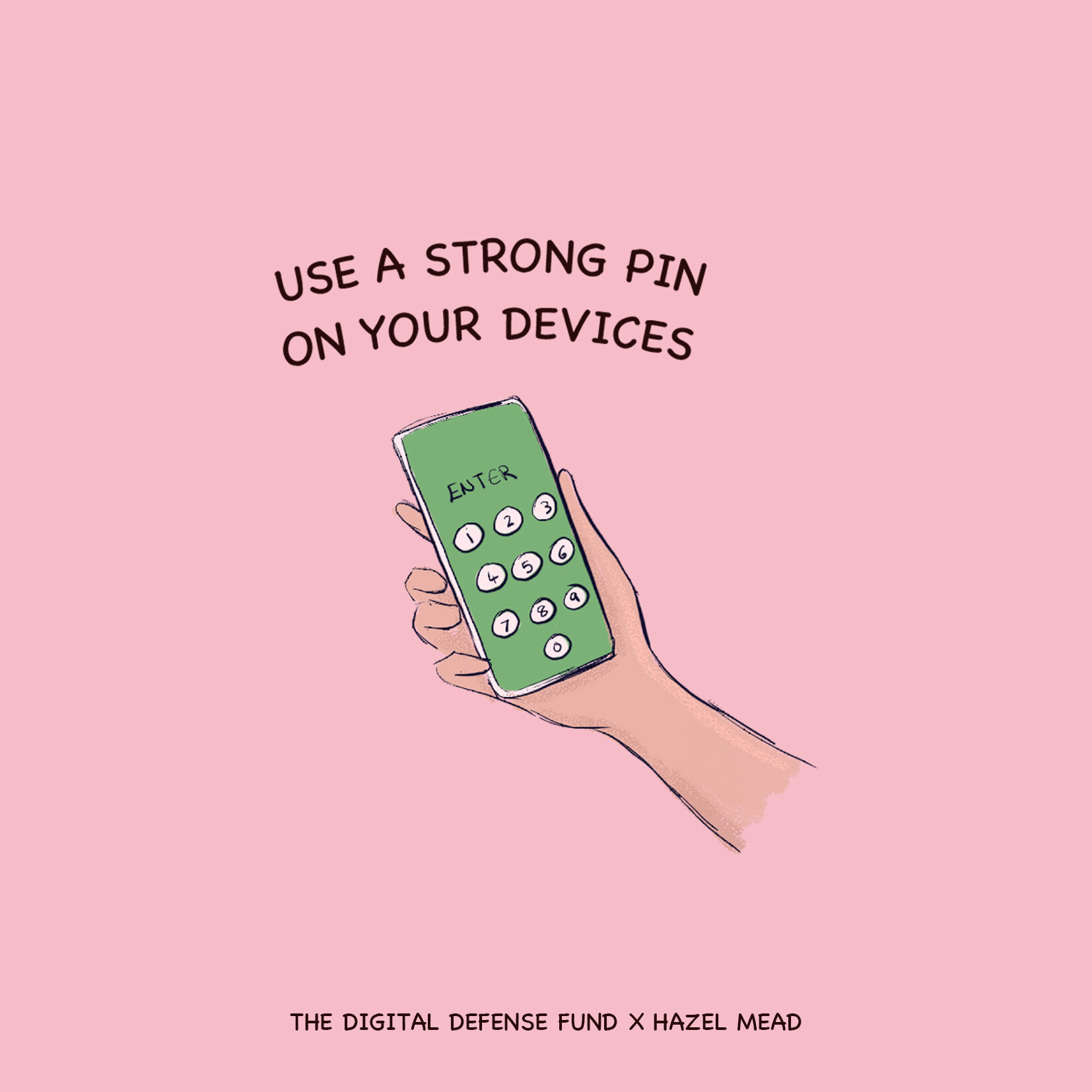
Use a strong PIN or password
iPhones and newer Androids are automatically encrypted when you protect them with a PIN. You now have the option to use an even stronger PIN by creating a 6-character (or longer!) PIN or password.
If someone demands access to your phone, you may decide it is safer to give them the PIN than to resist. Use the following steps to proactively remove information in case you need to protect your safety by sharing your PIN.

Browse in an incognito window or clear your browser history
Use Firefox Focus, a browser that automatically deletes your browsing history.
Use an incognito or private browser window, which automatically deletes your browsing history. You can use a private window in Safari, Chrome, and Firefox.
Manually clear your browsing history in Safari, Chrome, or Firefox. You can delete the whole history or in Chrome and Firefox, you can choose specific sites to delete.
Turn on disappearing messages in secure messaging app like Signal
The Signal messaging app allows you to set a time period after which all messages in that thread are automatically deleted. You can find instructions for turning on disappearing messages here.
Don’t want your phone company to have copies of your browsing history or texts about your abortion?
The problem: When you use the internet, your internet service provider can keep records of the websites you visit. (However, thanks to encryption called HTTPS, they can’t see what you do on those websites.) When you send a text via SMS, your phone company stores copies of all those texts. These can be turned over if the phone company gets a warrant, or used for advertisement. If you want to keep your information private from your phone company, you can do the following:
The solution:
Keep your texts private with an end-to-end encrypted messaging app like Signal
When you send a text via SMS, your phone company stores copies of those texts as well as metadata - data about who you are talking to and how often. Signal is a secure, end-to-end encrypted messaging app that doesn’t store your messages or metadata about them.
Keep your browsing private with Tor or a no-logs Virtual Private Network
Tor is a secure, free browser that encrypts your internet traffic and routes your internet traffic through multiple different computers, which masks the origin of your traffic.
VPNs route your internet traffic through their services instead of your internet service providers. It’s important to choose a VPN that doesn’t keep track of what you’re doing - commonly called a no-logs VPN. Most no-logs VPNs cost a few dollars a month, but there are two free options: ProtonVPN’s free tier, and Tunnelbear’s limited free tier.
Worried about protestors outside the clinic violating your privacy?
The problem: Unfortunately, some people who are against abortion stand outside abortion clinics to try to shame and embarrass people going into the clinic. These people don’t know anything about you, your life, or your pregnancy. Rarely, protestors will have cameras and will try to scare you by taking pictures of people going into the clinic.
The solution:
Wear a hat or hoodie, sunglasses, and your mask to make it harder for protestors to recognize you.
You can also use an umbrella to create a physical barrier between you and the protestors!
Know that only you know what is best for you.
Think of a comforting phrase that reminds yourself of this, and repeat it to yourself.
Watch this video from a licensed counselor about how to take good care of yourself before or after walking past anti-abortion protestors.
Note: The counselor uses gendered language to describe people seeking abortions. We know that not all people who have abortions are women. You may choose not to watch the video if you want to avoid gendered language.
Want to share these tips on social media? Download graphics to share on Instagram here! (Note: file download will be a .zip file. Double click to unzip and see the graphics.)
Download a poster with these digital security recommendations & share in your home, office, or community!
Abortion Mobile Privacy Settings Quick Guide
Who is this guide for?
This guide below is for anyone who wants to keep records of their abortion experience off of their physical phone. These tips are also broadly applicable to a desktop computer, tablet, or other device.
Please note: copies of this data may be kept by the companies and platforms on their servers, but these tips can help ensure these sensitive experiences are not able to be easily accessed by looking through your device.
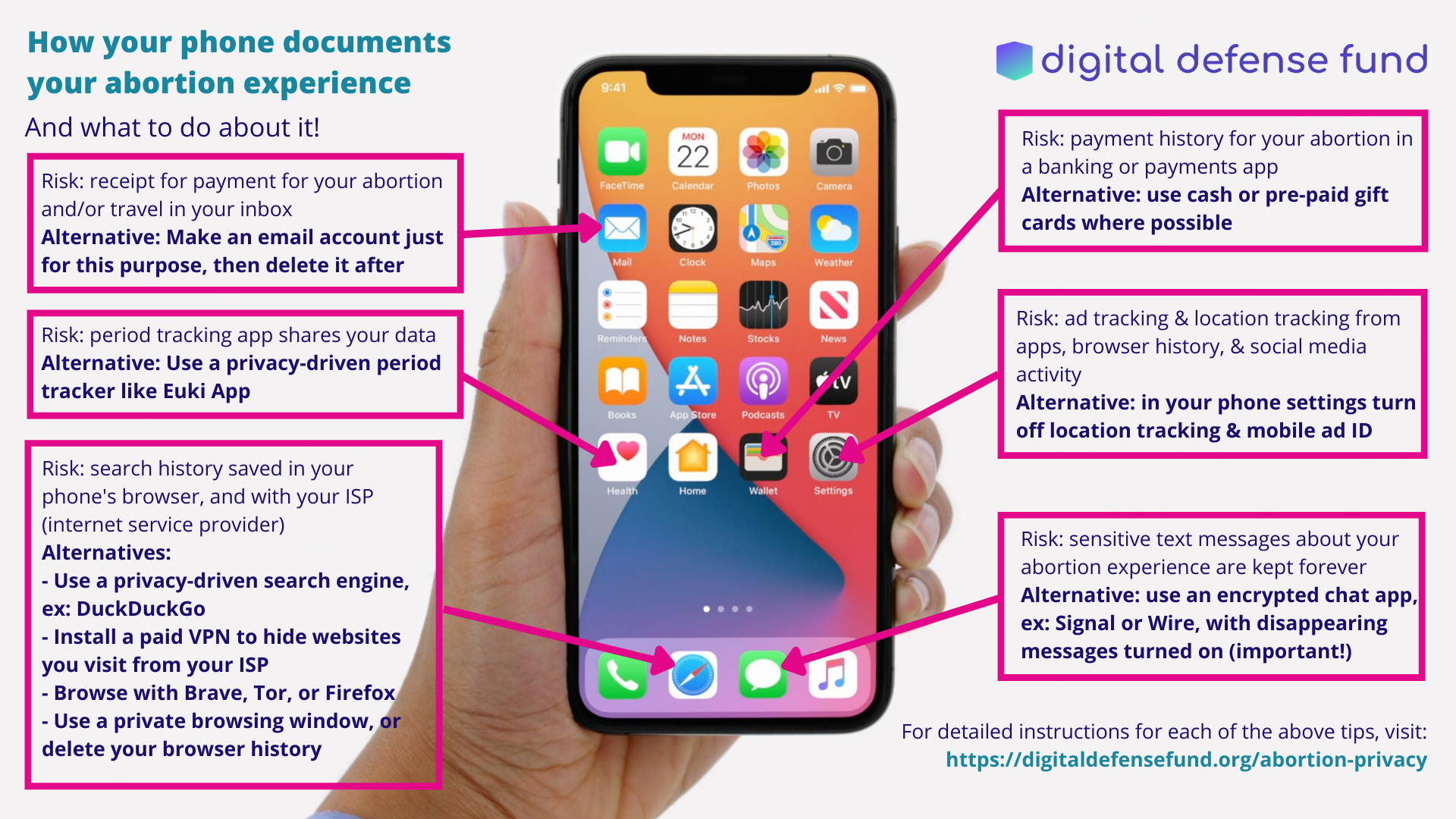
How does your phone document your abortion experience, and what can you do about it? Download and share this graphic for quick ways to improve your mobile privacy as you go through your abortion experience, or look to help someone else with theirs. You may choose to use some or all of these practices, depending on your own personal concerns and which risks you’d like to address. You are the expert of your situation!
Remember: these tips only prevent copies of sensitive data from being stored indefinitely on your phone itself. Platforms may still keep their own copy of that same data. Ex: I can delete an email from GMail in order to ensure it can’t be found by someone searching through my phone, but Google will still retain a copy of that email on its servers for an amount of time specified in its Terms of Service. We have done our best to recommend only end-to-end encrypted chat options that do not store unencrypted backups that can be accessed in this way. Ex: Signal does not keep any copies on its servers of any message. So don’t forget to turn on those disappearing messages!
Need more detailed instructions? Scroll up to each section of the guide on this page for more information.
Please note: as with the rest of this guide, these privacy recommendations are for informational purposes only, and do not constitute legal advice. Please consult with your own counsel for any questions on applicable local, state, or federal laws.
Image Alt text:
How your phone documents your abortion experience and what to do about it! By: the Digital Defense Fund
Risk: receipt for payment for your abortion and/or travel in your inbox Alternative: Make an email account just for this purpose, then delete it after
Risk: period tracking app shares your data Alternative: Use a privacy-driven period tracker like Euki App
Risk: search history saved in your phone's browser, and with your ISP (internet service provider) Alternatives: - Use a privacy-driven search engine, ex: DuckDuckGo - Install a paid VPN to hide websites you visit from your ISP - Browse with Tor or Firefox - Use a private browsing window, or delete your browser history
Risk: payment history for your abortion in a banking or payments app Alternative: use cash or pre-paid gift cards where possible
Risk: ad tracking & location tracking from apps, browser history, & social media activity Alternative: in your phone settings turn off location tracking & mobile ad ID
Risk: sensitive text messages about your abortion experience are kept forever Alternative: use an encrypted chat app, ex: Signal or Wire, with disappearing messages turned on (important!)
For detailed instructions for each of the above tips, visit: https://digitaldefensefund.org/abortion-privacy
The artwork on this page is licensed under a Creative Commons Attribution-NonCommercial-NoDerivs (CC BY-NC-ND 3.0) license. You can reproduce and share these images freely, as long as you do not share them for profit. Please do not crop out the attribution. Thank you!
Last updated 3/8/2021

